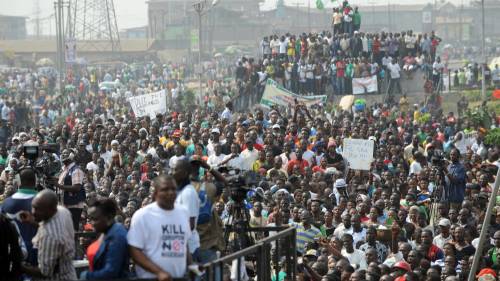The march of people on the streets in their numbers, demanding for a change in policy, justice and protection of human right has historically been known to bring about change. In 1963, Martin Luther King Jr., in Lincoln memorial, backed by 200,000 supporters, protested the racial inequality that kept blacks from having the same opportunities as the whites.
This protest led to the Civil rights acts of 1964 and the Voting Right Act of 1965. In 1982, a German pastor held Monday prayer services to spread the message of peace during the cold war. Over the years, few people grew into hundreds and thousands. Before long protesters started coming from everywhere to seek refuge in the church. On a particular Monday, 300,000 people gathered and one week after, in October 1989, the Berlin wall came down.
Protests are not a thing of unfamiliarity in Nigeria. In 1929 the popular Aba women riot too place. The women from a town named Oloko gathered women from other Bende district after a widow had a confrontation with the warrant chief representative. Approximately a total of 100,000 women gathered that day.
This led to the removal of warrants chiefs and the British had to drop plans on directly taxing market women. Another protest was the Occupy Nigeria protest which held between January 2 – January 14, 2019. Nigerians took to the streets and social media to protest the removal of subsidy on petroleum products which led to a 120% increase in price. This was a nationwide protest which was participated in both by Nigerians at home and abroad. Why then has the zeal for protest reduced over the years?
READ ALSO: Ganduje About To Dethrone Sanusi, Says He Received Requests
The occupy protest led to the death of 16 Nigerians, all shot by the Nigerian police. No matter how peaceful the protest starts off it always escalate into the opposite. The Shai protest in July led to the death of at least four members of the Islamic group. The group took to the street in the federal capital demanding the release of their leader, Ibrahim El-Zakzaky.
The protest which kicked off as a peaceful one with supporters chanting “free Zakzaky” were attacked by the police. This clash led to the death of four people and many were left injured, a witness at the scene claim that the police fired first.
Former political aspirant, activist and journalist, Omowole Sowore led a protest tagged “Revolution now” the protest was to fight for the unjust situations the Nigerian government has put Nigerians through. The protest has Nigerians on the street singing the famous revolutionary anthem about solidarity and fighting for rights. This led to his arrest and spending over 100 days in DSS custody. Police also fired tear gas at protesters and arrested as many people as they could.
In a country where basic human rights are stifled by the government and freedom of speech is tagged as treason, it is obvious why people would rather sit in the comfort of their homes and complain from the back of a screen. The laws meant to protect protesters are not being implemented and no protest is seen as peaceful by the Nigerian police. Nobody wants to die for a cause that would not count after their death. Until Nigerians are sure that they are safe to protest freely, we would see fewer people turn up for protests.



Leave a Reply